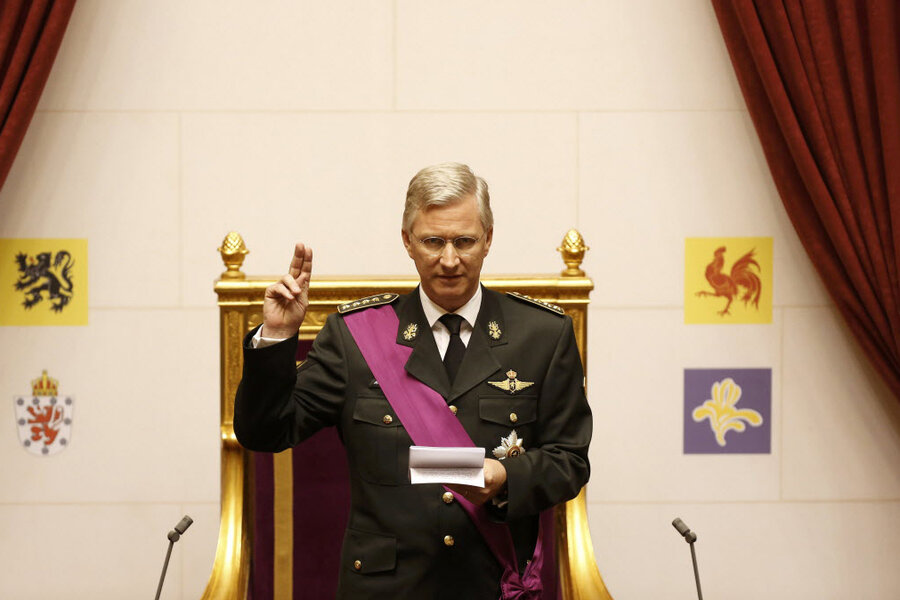New king says Belgium's divisions are a strength
Loading...
| Brussels
King Philippe I became Belgium's seventh monarch on Sunday's national day after his father Albert abdicated as the head of this fractured nation.
After he took the oath at the parliament filled with representatives of the 6 million Dutch-speaking Flemings and 4.5 million Francophones, Philippe insisted "the wealth of our nation and our institutions consists in turning our diversity into a strength."
The ceremony capped a day of transition which started when Philippe's father, the 79-year-old Albert, signed away his rights as the kingdom's largely ceremonial ruler at the royal palace in the presence of Prime Minister Elio Di Rupo, who holds the political power in this 183-year-old parliamentary democracy.
Less than two hours later, the nation got a new king when Philippe, 53, pledged to abide by Belgium's laws and constitution.
Flemish separatism
While crowds of well-wishers cheered the royal family's every move Sunday, far from everybody in Belgium was happy with the new king.
One Flemish separatist group, the Flemish Interest party, boycotted the parliamentary ceremony, while the legislature's biggest party, the N-VA New Flemish Alliance, sent only a limited delegation without its leader, Bart De Wever.
"We are full-blooded democrats and the purest form of democracy is the republic," said Jan Jambon, the parliamentary leader of the party, which has surged to become the main opposition party seeking Flemish independence through transition.
Their absence also highlighted one of the biggest challenges Philippe will face in his reign – how to remain relevant as a unitary symbol in a nation ever more drifting apart between the northern Flemings and the southern Francophones.
Philippe made no attempt to paper over those cracks, instead casting the country's division as one of its strengths.
"Time and again we find the balance between unity and diversity," King Philippe said. "Belgium's strength is precisely that we make room for our differences."
No interruptions
Unlike a disturbance during the oath-taking by King Albert 20 years ago, when one legislator shouted "Long live the European Republic," Sunday's ceremony in the packed legislature was flawless, with Albert and Philippe's wife, Queen Mathilde, looking on as he confidently took the oath.
Philippe has long been contested as a worthy successor of Albert, but after years of wooden and timid public performances, the silver-haired, bespectacled monarch came over as confident and pressure proof.
"Belgium is modernizing itself and it gives me joy," Albert said. In a rare show of public affection for his son, the two embraced warmly when Albert signed away his rights as the kingdom's largely ceremonial ruler at the royal palace.
Under crystal chandeliers in a gilded hall at the royal palace, Prime Minister Di Rupo called Albert "a great head of state" and told the outgoing king, "You are closing an important page in the history of our country."
Albert announced his abdication plans less than three weeks ago, so there was little time to turn the occasion into a huge international event. No foreign royals were at the ceremony. Since the royal transition coincides with Belgium's national day celebrations, a military parade had already been planned.
Elections soon
Philippe will face a tough task in the coming months. The fractious nation, divided by language, holds parliamentary elections in June 2014 amid calls for even more autonomy for the language groups.
After the last elections in 2010, it took a record 541 days before a government could be formed amid bickering about how much more power should be sapped from the central state to profit the separate language groups. Then, as likely next year, the N-VA will play a key role.
Unlike his five predecessors, Albert tried to avoid politics as much as possible and Philippe is expected to do likewise.
Philippe has been groomed for the job as a leader of foreign trade delegations over the past two decades.
"He is a very wise person, a person who is very well prepared," said EU Commission President Jose Manuel Barroso, who attended the ceremony. "He knows the politics of Belgium and Europe very well."







